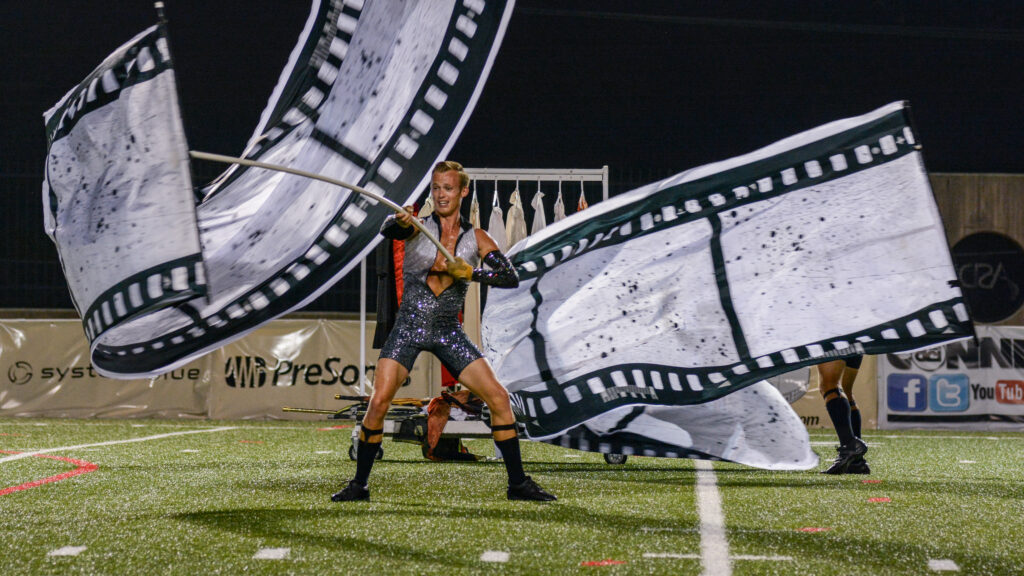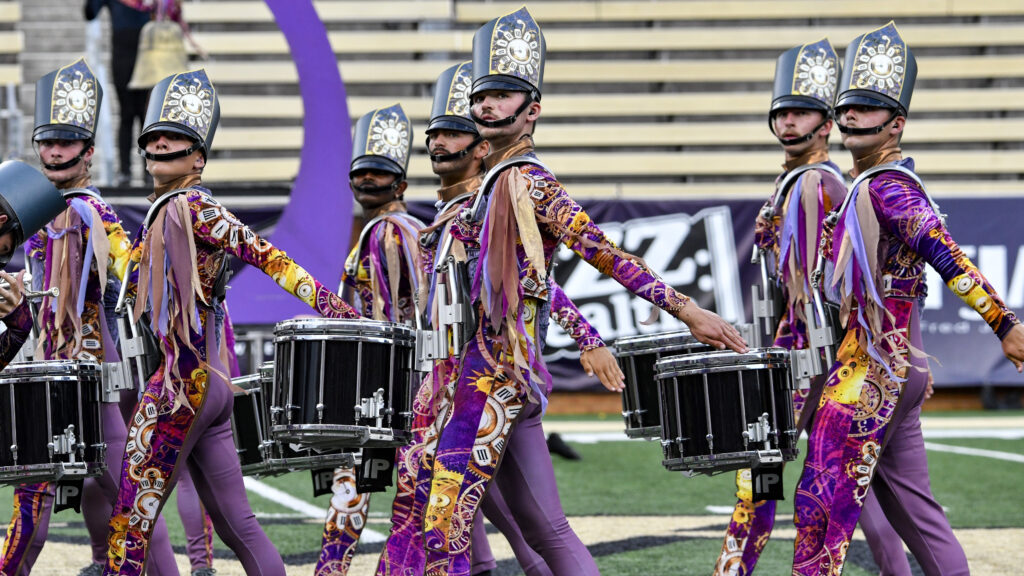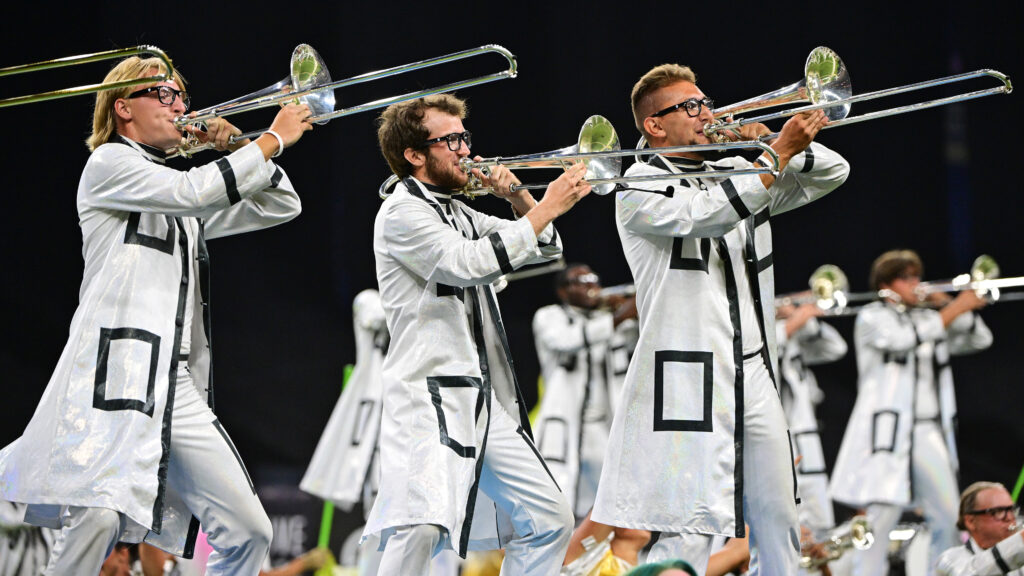The 1990 Drum Corps International Tour didn’t unfold quite the way many expected.
Until July 28, both Blue Devils and Phantom Regiment were undefeated, before the Devils topped Regiment at the DCI Midwest Prelims in Whitewater, Wisconsin. Then in that event’s Finals competition, Cavaliers topped both those groups, meaning no corps would go undefeated by the time of the DCI World Championships three weeks later in Buffalo, New York.
When the smoke cleared, the Cadets of Bergen County would win their fifth DCI title, followed in second place by The Cavaliers and in third by Star of Indiana. For the first time in DCI history, there were no California corps amongst the top two finishers.
Dutch Boy became the first Canadian finalist since 1977, and Magic of Orlando first entered competition, though it would be four years before the corps would be seen among DCI’s top 12 corps.

The Cadets were fond of playing the music of Leonard Bernstein decades before becoming an official ambassador for the composer in 2017. After winning a number of times in the 1980s with Bernstein-centered productions, by 1990 The Cadets came to the field with “A Bernstein Celebration,” topping the field outside Buffalo just two months prior to the composer’s death at the age of 72.
In addition to being a composer who conquered both the concert hall and Broadway theaters, Bernstein was an accomplished pianist, a world-renown conductor who made more than 400 recordings with the New York Philharmonic, an author of numerous books on music appreciation, and a television personality whose programs analyzing music in terms the average person could understand became standard film programming in schools.
The Cadets’ show opened with Bernstein’s “Overture to Candide,” first performed by the corps in 1985. The operetta was based on the writings of Voltaire, and perhaps surprising to today’s audiences, was quite a bust upon its 1956 Broadway opening. The overture is a tricky piece to march to, being written in a series of continually changing rhythmic meters.

After a boisterous fanfare, the corps blazed through the rapid-fire meter changes. During a pause in the action between two segments of the overture, members of the horn line delighted audiences by lifting their right legs and scratching the inside of their left legs with their right foot, doing this while playing two transitional chords. The frenetic pace of the remainder of the work was tiring to both the audience and the corps’ members.
“Selections from ‘Mass’” was extracted from the 32 segments that comprised Bernstein’s “Mass” theatre production of 1971, the same work that the corps utilized for its 2017 production and the work that comprised most of the corps’ 1983 title-winning show.
“Mass” was commissioned by Jacqueline Kennedy, widow of slain President John F. Kennedy, for the opening of Washington D.C.’s Kennedy Center for the Performing Arts. Originally, Bernstein had planned on writing a rather traditional setting of the Roman Catholic mass, but then decided to work in more and more contemporary influences to the point that it became a hugely scaled theatrical production. For lyrics, he turned to Stephen Schwartz, who had achieved fame earlier in 1971 with the music and lyrics to “Godspell.”
Reviews at the time savaged the work, with the New York Times critic referring to it as “pseudo-serious” and “cheap and vulgar,” further stating that it was “the work of a musician who desperately wants to be with it.” The Vatican did not approve of the tampering of the traditional mass, to which Bernstein added theatrical elements more in common with “Jesus Christ Superstar” than anything the classical masters had created. Several performances throughout the country were cancelled under pressure of local parishes. However, everything came full circle in 2000 when Pope John Paul II requested the work be performed at the Vatican.

The Cadets’ rendition opened with a few seconds of the haunting “First Meditation,” a work originally written solely for orchestra to allow for a scene reset. Female members of the color guard draped white scarves over their heads in the manner of prayer shawls. An accelerando into the very end of “Sanctus” led into the feverish “Agnus Dei” as the corps breezed through an outline of an Ichthys, the ancient Christian fish symbol, accompanied by stained glass flags.
The mood changed dramatically with “Somewhere” from Bernstein’s famed “West Side Story,” a selection first performed by the corps in 1961 and 1962. Since drum parts didn’t fit with the music, drummers picked up long white scrims that were unfurled to form a continuous wall of white, in front of which a lone mellophone player introduced the melody while a member of the color guard lifted up a shako. The piece milked every ounce of emotion out of the melody, with the guard members and some drummers participating in an emotional pas de deux.
The closer opened with the jubilant circus-like cacophony of Bernstein’s “Galop” from “Fancy Free,” a 1944 ballet written for impresario Jerome Robbins and the New York City Ballet. Bernstein eventually reworked the ballet into his musical, “On the Town.” “Galop” was the seventh and final part of the work, relatively unknown because it wasn’t included in the “Three Dance Episodes” from “Fancy Free” that became popular concert hall fare.
After the initial performance of “Galop,” the music came to a halt before resuming with a tag ending written in the style of the piece. That ending incorporated various Bernstein themes, starting with “Sanctus” from “Mass,” progressing through the main theme from “Candide,” followed by a reprise of “Agnus Dei,” into the secondary flowing theme from “Candide,” and throwing in a little reference to the corps’ title winning “Appalachian Spring” show of 1987. Granted, Aaron Copland, who was a close friend of Bernstein, wrote that particular piece. However, no one in the audience seemed to mind that temporary diversion.

The brass players then marched into a rendition of “Tonight,” reminiscent of the brilliant surprise company front that DCI Hall of Fame member George Zingali wrote into the ending of the corps’ first-place “West Side Story” show of 1984.
Then, in one of the most inspired visual moments of the year, Zingali protégé Marc Sylvester unleashed the designer’s famed “Z-pull,” where two arcs connected by a slanted line in the center pulled apart from each other to form one continuous line.
But Sylvester had a trick up his sleeve, and before the “Z-pull” could complete itself, the drill and the music reversed as if one pressed the rewind button on a tape player, taking everything back to where it was a few seconds earlier. The crowd laughed as enthusiastically as it applauded through the last several seconds of the show.
1990 Overview

Michael Boo was a member of the Cavaliers from 1975-1977. He wrote about the drum corps activity for more than 35 years while serving as a staff writer for various Drum Corps International projects. During his lifetime Boo wrote for numerous other publications including an honors-winning book on the history of figure skating. He also was an accomplished composer. Boo passed away in 2020 and was inducted into the DCI Hall of Fame posthumously in 2021.





